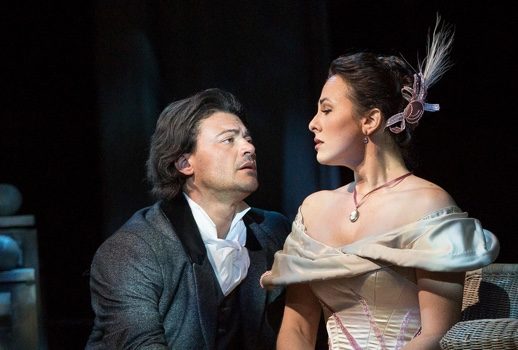
He recently showed New York audiences how sexy suicide can be when he sang the role of Roméo in Gounod’s Roméo et Juliette earlier this year. His work in that opera was exemplary of the romantic notions attending self-destruction. However, in Werther he extended his good looks and gorgeous tenor to the extreme, making toxic notions of liebestod even more attractive.
As the eponymous protagonist of Massenet’s opera at the Met, his muscular tenor, bold and wonderfully guileless, sailed through the score Thursday night. He is a singularly robust singer, vibrating with longing, frustration, and despair; his performance was reckless in all the right ways, abandoning itself to the role’s demands.
In stark contrast, but no less attractive, the handsome beauty and resolute vocal security of Isabel Leonard’s Charlotte provided a balance to Grigolo’s manic Werther. Her stoical loyalty to her husband, cracking slightly under the pressure of Werther’s impassioned erotic overtures, was a tight foil for Grigolo’s high-octane affect. Less flashy, but no less impressive, the mezzo-soprano richly conveyed nuance and a variegated emotional palette. This was especially true during the famous aria “Va! laisse couler mes larmes” from Act III.
As her younger sister Sophie, Anna Christy seemed out of place within the milieu onstage. Her soprano wavered in intonation, sounding weak and under-supported. She seemed to take her role, deceptively complex in its relationship to Werther and Charlotte, for granted: she lacked depth—a radiant, innocent confusion from her vantage point of observation—and thus she seemed superfluous.
And the same could be said of Maurizio Muraro and David Bizic, in the supporting roles of the Bailiff and Albert, though their vocalism was notably more secure than Christy’s. As Charlotte’s father and husband, their mechanical embodiments of the pressures attending her female subjectivity lacked specificity and menace. They were so easily brushed aside by the force and passionate bravado of Grigolo’s dreamy Werther.
Edward Gardner led the Met Orchestra with touching sensitivity, drawing from the score an aching melancholy. Similarly, Richard Eyre’s production has an effectively temporal quality, moving serenely through time and space, elegant and nostalgic with cinematic touches. The production is well suited for the two lead performers, who boast movie-star good looks as well as world-class voices.
The opera’s plot, based on the novel Die Leiden des jungen Werther by Goethe, is disturbing and impolite. Werther, an emotional and sensitive poet, falls in love with Charlotte. However, Charlotte has promised her deceased mother to marry Albert. Charlotte’s vow makes her unavailable to Werther, who struggles and fails to accept this reality. As a result, he chooses to end his life with a pistol.
Beyond the glorification of Werther’s suicide, the romance of his emotional turmoil is unnerving to modern sensibilities, where mental illness and depression are treated with the gravitas they deserve. In Massenet’s opera, the protagonist is romanticized as the lover par excellence, a man so devoted to his beloved that he would rather die than live in a world without her.
This notion is bleakly destructive: a male suitor once again holding a woman hostage through threats of destruction. One cannot help but think of Carmen—the ruder, more impolite stepbrother to Werther. In both instances, the male protagonist throws a hissy fit because he cannot get what he wants: in Carmen’s case, Don José destroys both Carmen and himself.
Fortunately for Charlotte, Werther’s destruction is relegated only to his body, and he leaves her in good health, free to continue her life with Albert. And yet, perhaps this comparison is unfair, as Charlotte reciprocates Werther’s longing, while in the end Carmen doesn’t seem to feel much of anything for Don José.
If one can complain about any aspect of Eyre’s production, it’s that self-destruction, suicide, and depression go unchecked. We are asked to buy into Massenet’s reading of the text; untreated mental illness remains free of critique; Werther is worthy of our celebration, awe, and reverence. In my view, this is a sentimental, immature understanding of what it means to love.
However, I believe a counter claim might be constructed in favor of Werther as a celebration of love as mental illness. In Plato’s Phaedrus, Socrates argues that love is a kind of madness. He instructs the young, impressionable Phaedrus, “the best things we have come from madness, when it is given as a gift of the god.” One of these gifts is clearly the madness of Eros. And this is the same insanity that grips Werther.
Maybe one could argue in favor of Werther’s convictions, his refusal to do business as usual. In this sense, I suppose he might be understood as an obliquely queer figure, refusing to play along with the accepted roles of his gender. Unable to hurt anyone but himself, he withdraws from the world in an act of radical anti-social behavior. In that sense—as politically incorrect as it might sound, and as Plato argues in Phaedrus—Werther’s love for Charlotte is a kind of mental illness, madness bestowed upon him by the gods.
Photo by Marty Sohl/Metropolitan Opera.



